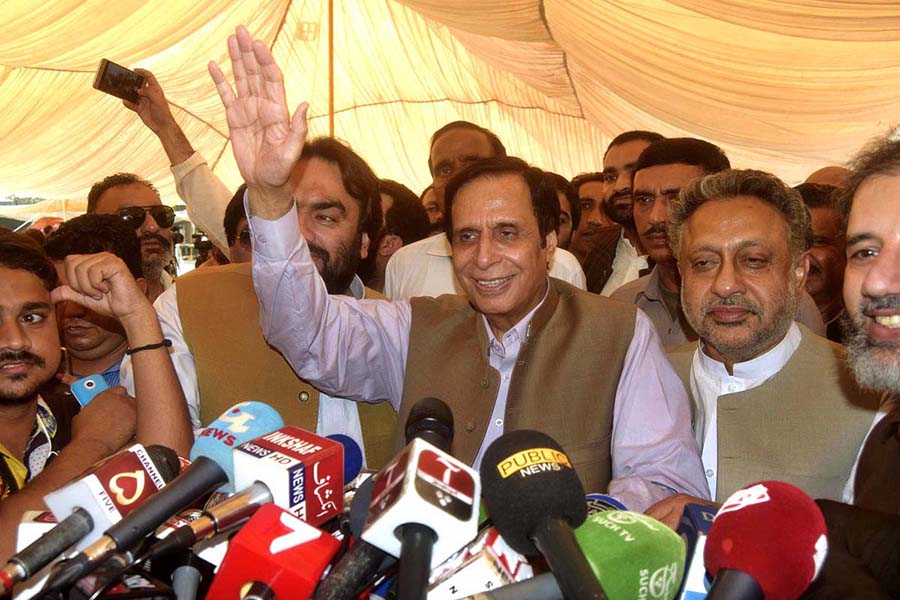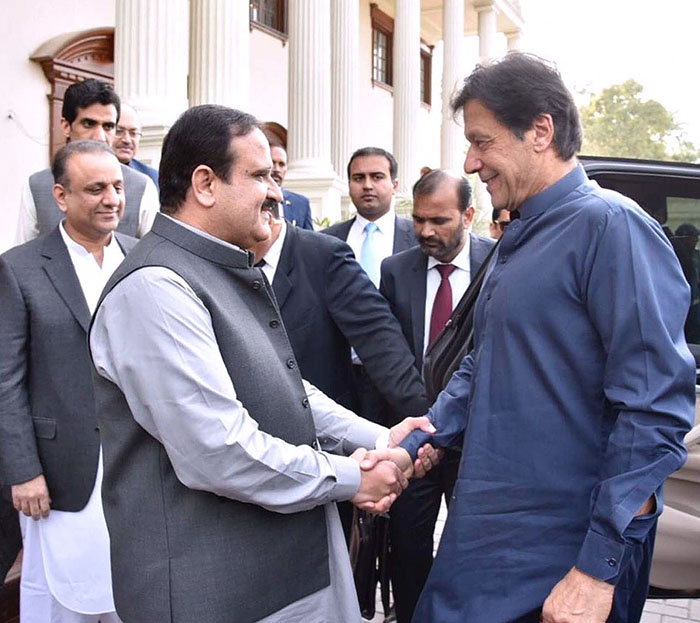It was an intimate gathering. A video leaked earlier this month showed three leaders of the Pakistan Muslim League-Q seated across the table from Jahangir K. Tareen of the ruling-Pakistan Tehreek-e-Insaf (PTI).
“Sir, you need to control [Chaudhry] Sarwar,” Tahir Bashir Cheema, the minister for housing and works, could be seen pleading. “Please,” interjected Chaudhry Pervaiz Elahi, the speaker of the Punjab assembly. “He will not let your chief minister work,” Cheema went on before the video abruptly ended. Sarwar, the man under discussion, is the governor of the Punjab province, appointed by Tareen’s party.
Since then, both Sarwar and Elahi have downplayed the incident. “Even families fight,” Sarwar told the media later, “There is no misunderstanding.” But that may just be half the story.
In Punjab, Pakistan’s most populous and politically important province, the PTI and PML-Q are coalition partners. Yet, both are at loggerheads. Since the July polls, what began as a slow rumble of complaints has now gained pitch.
There is a visible tug of war between the two parties over who controls the bureaucracy, reveal officials Geo.tv spoke to. That, coupled with a shortage of civil servants and frequent postings and transfers has created an administration crisis.
The PML-Q is a small political partner, with only eight seats in the 371-member Punjab assembly. Then why, ask peeved PTI parliamentarians, is it being allowed to assert more than its fair share of influence in the province?

As per the law, the most powerful man in a province is the chief minister. That man in Punjab is Usman Buzdar of the PTI. But, in the power corridors, Elahi has the last word. He, along with the Punjab chief secretary, Yousuf Naseem Khokhar, decide who stays and who is shuffled in the civil service.
Khokhar, although appointed by the PTI government, has old ties with Elahi. He worked under the PML-Q leader during the tenure of former president Pervez Musharraf, when Elahi was the chief minister of the province. Bureaucrats complain that he does exactly as Elahi says, and not what the chief minister orders. Even though, the chief secretary, under the constitution, is to report directly to the chief minister of a province.
This one-man show in Punjab has bogged down the wheels of administration. Postings are slow, which means that many provincial departments, especially health and education, have no secretaries and senior bureaucrats. Nervous PTI parliamentarians say they will not be able to achieve the prime minister’s 100-day agenda with no staff.
The deadlock is also scaring away senior bureaucrats, who are choosing to surrender to the centre rather than continue working in Punjab, admit civil servants, who did not want to reveal their identities.
In the ministry of primary health, the post of secretary remained vacant for several months. When one was finally appointed, he submitted his leave application within an hour. Similarly, in the ministry of sports, three secretaries were changed within a span of four days. Over in higher education, Sara Saeed was appointed the secretary. But then quickly relocated. In the last few weeks, Saeed has served in three different ministries: energy, women development and higher education.

For the PTI provincial ministers, the situation is frustrating. Understanding that the chief minister is helpless, many have gone directly to Prime Minister Imran Khan with their litany of grievances. But the meeting with Khan, they say, was not very encouraging. He pushed them to continue working on their set targets and to stop grumbling about the bureaucracy.
Privately, the ministers of the ruling party explain that if they do not get the bureaucrats of their choice they won’t be able to deliver. On paper, a cabinet member is expected to work with any secretary appointed to his department. But in practice, ministers are used to getting the men, and women, of their choice. “This is not happening anymore, especially for the PTI ministers,” said an official privy to the development, who asked not to be named, “On the other hand, ministers from the PML-Q have no such complains thanks to their leader Pervez Elahi. He delivers whoever they need.” The sway is such, adds the official, that at a recent provincial cabinet meeting the Punjab chief secretary only shook hands with ministers of the PML-Q, ignoring those from the PTI.
But Elahi is not the only power centre in the most prized province. After dislodging the Pakistan Muslim League-N, which ruled Punjab for several years, everyone wants a say in running the province. Buzdar is asserting himself in the postings and de-postings of South Punjab, from where he hails. While, Chaudhry Sarwar, the governor, is personally overseeing any development work in Faisalabad and Toba Tek Singh, much to the dislike to PML-Q leaders, as was evident in the leaked video.
Too many people, it seems, have a say. The confusion is further evident in the police service. On September 8, Muhammad Tahir was appointed the chief police officer in Punjab. A month later he was removed and replaced by Amjad Javaid Saleemi.
In fact, one of the largest reshuffles was ordered last month. Dozens of officials were asked to pack up and move, particularly from the police service. Among those transferred was BS-20 officer Sohail Habib Tajik. He was posted as Bahawalpur’s regional police officer (RPO). But as soon as he reached Bahawalpur and assumed charge another notification was issued by the Punjab Services & General Administration, asking him to report back to Lahore as deputy inspector general of the VVIP Security in the Special Branch. Interestingly, Tajik received the orders while he was in a meeting to discuss the law and order situation in the wake of the Supreme Court’s acquittal of Asia Bibi. Those close to Tajik say that he was not in the good books of PML-Q leader Tahir Bashir Cheema, who was elected from Bahawalpur.
But others in the PTI dispel the impression that two political parties are locking horns. “The only reason we are experiencing some problems is because many senior civil servants are completing their management courses until December,” Raja Yasir Humayun Sarfraz, the Punjab minister for high education and tourism, told Geo.tv. “The chief minister is fully in command.” The PTI government, he went on, has no prior experience of running Punjab, hence it is taking its time adjusting. “I have achieved my 100-day agenda on my own which was to develop a roadmap for the next five years,” Sarfraz said. Even if Sarfraz has achieved his set targets, what of the others? Will they have anything to present as the 100-day deadline approaches?
More importantly, is PTI really in control of the province it rules?


